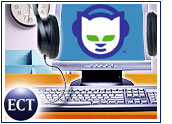
There’s an article in Britain’s prestigious Times Online today called “Q&A: Napster and the Music Industry,” which seems — at least on the surface — to explain what Napster 2 will mean to Britons now that its owner, Roxio, has succeeded in snaking it into the United Kingdom.
“Easy, safe and legal” Napster relaunched, said the Financial Times yesterday.
Does that mean OD2 or iTunes, for example, or LimeWire, Blubster, BearShare, Morpheus, Grokster or any of the other commercial P2P applications is hard to use, unsafe and illegal?
No, although the implication is there. It’s a reference to Shawn Fanning’s Napster, the application that fired the first, resounding shots in what have since become the file-sharing wars.
Shallow Attempt To Cash In
Britons don’t know Napster 2 is a shallow attempt to cash in on what was. They haven’t been exposed to Napster 2 in the same way North Americans have. They still remember the old Napster, the P2P file-sharing application that first freed music lovers from the iron grip of the corporate music industry, and they think there’s a similarity.
However, Napster 2 bears not the faintest resemblance to the application from which it draws its name. It’s a cynical — and not very effective — hard-core marketing tool designed to get people in the United Kingdom to spend far too much on far too little.
Napster, High-Flying Internet Store?
Digital download service Napster scored a major victory over archrival iTunes by launching in Britain Thursday, the first of the high-flying Internet music stores to make its European debut, according to Reuters.
High-flying Internet music stores? The flaccid online sites supported and supplied by the Big Five music labels?
“Napster goes live in UK, beating rivals,” said an International Herald Tribune headline. “First blood to Napster in the battle for online music sales,” said the Telegraph.co.uk. “Napster’s a British beachhead,” said Daily Variety. And “Napster relaunch takes music industry by surprise,” said the Guardian.
Napster 2, which hasn’t made a ripple in the North American music pool, “is launching in a brutally competitive European market,” the Reuters story said, completely ignoring the reality that, at this point, there is no European market, brutal or otherwise. Nor is there much in the way of competition.
The music industry supplies everyone, everywhere, with the same 500,000 to 700,000 tracks that the corporate online music “stores” then attempt to resell at more or less the same grossly overblown prices.
Big Music’s ‘Product’
The launch of Phonoline, Germany’s addition to the online corporate music store line-up, was a fiasco — even embarrassing German Chancellor Gerhard Schroder. Critics claimed the selection was too limited and the price of downloading individual songs too high.
Napster 2 is offering the very same Big Five “product” at twice what it’s trying — and failing — to get in North America: 1.09 pounds (about US$1.94) per track. In the United States, the same product goes for 99 cents — about .56 pence UK.
In the meantime, a serious lack of credibility isn’t all Napster 2 has to contend with. In North America, when it comes to corporate music services, iTunes reigns supreme, and although the Recording Industry Association of America shoehorned Napster 2 into the American university system as its campus sales division, in effect, it isn’t even a shadow on the wall.
ITunes, too, is on its way into the United Kingdom. But even without that as competition, Napster 2 must still go toe-to-toe with OD2, which — with Peter Gabriel flying its flag — is thoroughly entrenched throughout Europe as the primary corporate music presence.
Napster 2 Hasn’t Beaten Anybody
Napster II hasn’t beaten anyone at anything in the United States and certainly won’t get anywhere near OD2 — or anyone else, for that matter — in Europe. So is Napster the future of music? “Until an even bigger idea comes along, yes,” said the piece in the Times.
That is, of course, ridiculous. “Will Napster kill High Street record stores?” asks a BBC story. No fear — not even nearly.
Meanwhile, as Big Music struggles to eliminate uncontrolled and unauthorized file-sharing, and while Apple boasts that it sold 70 million tracks in its first year of sales, online music lovers are downloading 1 billion free tracks every month, according to stats from music-industry tracker Big Champagne.
Thus, at the end of the day, legal downloads aren’t that interesting to consumers.
Jon Newton, a TechNewsWorld columnist, founded and runs p2pnet.net, a daily peer-to-peer and digital media news site focused on issues surrounding file-sharing, the entertainment industry and distributed computing. p2pnet is based in Canada where sharing music online is legal.












































